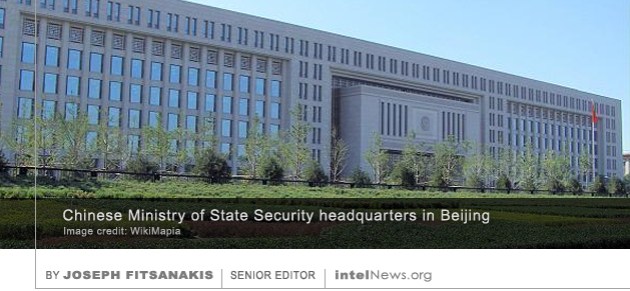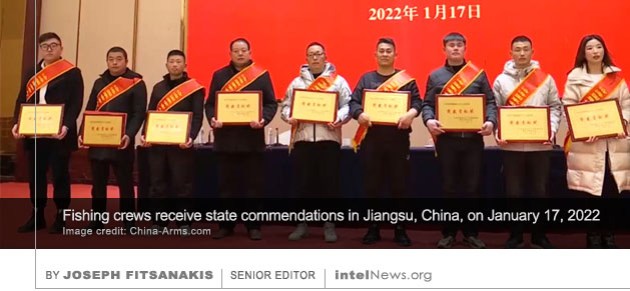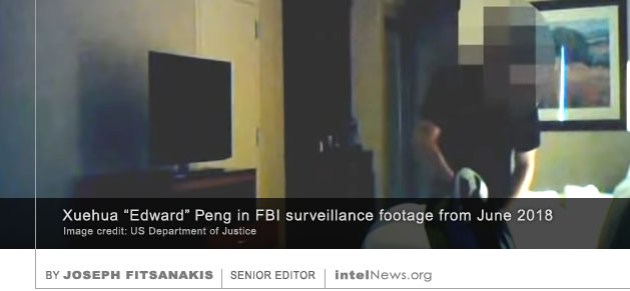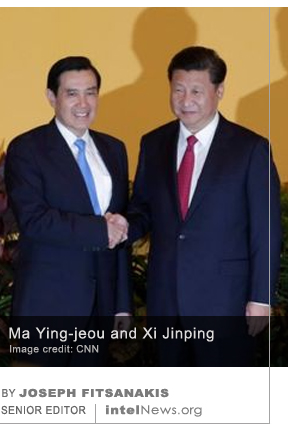Tradecraft observations on the Reichenbach/Fischer espionage case
May 3, 2024 3 Comments
 SEVERAL CASES OF CHINESE espionage have been announced recently in Europe. Thomas Reichenbach and Herwig and Ina Fischer —a married couple— were arrested on April 22, 2024, for illegal exports of dual use technology with military (naval) applications.
SEVERAL CASES OF CHINESE espionage have been announced recently in Europe. Thomas Reichenbach and Herwig and Ina Fischer —a married couple— were arrested on April 22, 2024, for illegal exports of dual use technology with military (naval) applications.
Reichenbach lists himself as a contract marketing manager for the Hong Kong Trade Development Council. He studied at Peking University in the mid-1980s. He worked in China, speaks Mandarin, and has a Chinese wife.
Herwig and Ina Fischer own a small engineering consulting company named Innovative Dragon in Duesseldorf. Both have travelled extensively in China. Innovative Dragon contracts for technical research with universities. Herwig studied mechanical engineering and aircraft and spacecraft construction at the Rhine-Westphalia Higher Technical School, focusing on guidance technology and composite fiber materials. The company headquarters are in London and there are offices in Duesseldorf and Shanghai (Donghua University Science and Technology Park). The London office does not appear to have a functioning telephone number.
Reichenbach is suspected of having been recruited by the Ministry of State Security (MSS) in China. The German government has accused the trio of having illegally exported dual use technology since at least 2022. At the time of the arrests, the suspects were in negotiations on additional research projects useful for expanding the combat strength of the Chinese People’s Liberation Army Navy.
Status: Alleged
Tradecraft observations:
- Use of a potential front company in London to facilitate allegedly illegal exports.
- Use of third countries to facilitate allegedly illegal exports.
- Reichenbach allegedly recruited Herwig and Ina Fischer and handled them as in-country assets.
- It is alleged that the MSS probably recruited Reichenbach in China.
- An MSS officer allegedly handled Reichenbach from China (linear control).
- The MSS allegedly funded the operation through front companies.
► Author: Nicholas Eftimiades* | Date: 03 May 2024 | Permalink
* Nicholas Eftimiades is a Senior Fellow at the Atlantic Council. He retired from a 34-year government career that included employment in the United States Central Intelligence Agency, the Department of State, and the Defense Intelligence Agency. He held appointments on the Department of Defense’s Defense Science Board and the Economic Security Subcommittee of the Department of Homeland Security’s Homeland Security Advisory Council. He is an advisor to the United States Intelligence Community. Eftimiades authored numerous works on China’s espionage methods. His books, Chinese Intelligence Operations (1994) and Chinese Espionage: Operations and Tactics (2020) are examinations of the structure, operations, and methodology of China’s intelligence services. They are widely regarded as seminal works in the field.
 FOR THE SECOND TIME in 10 days, the government of China has announced the arrest of a Chinese government employee on suspicion of spying for the United States Central Intelligence Agency (CIA). In a statement issued on Monday, China’s civilian intelligence agency, the Ministry of State Security (MSS), said it had launched an investigation into an official of a government ministry, who was allegedly caught conducting espionage on behalf of the CIA.
FOR THE SECOND TIME in 10 days, the government of China has announced the arrest of a Chinese government employee on suspicion of spying for the United States Central Intelligence Agency (CIA). In a statement issued on Monday, China’s civilian intelligence agency, the Ministry of State Security (MSS), said it had launched an investigation into an official of a government ministry, who was allegedly caught conducting espionage on behalf of the CIA. A CHINESE GOVERNMENT EMPLOYEE gave “core information” about China’s military to the United States, after he was recruited by a Central Intelligence Agency (CIA) officer in Italy, a Chinese state agency has said. The allegation was made in a statement that was issued on Friday by China’s civilian intelligence agency, the Ministry of State Security (MSS), on its WeChat social media account.
A CHINESE GOVERNMENT EMPLOYEE gave “core information” about China’s military to the United States, after he was recruited by a Central Intelligence Agency (CIA) officer in Italy, a Chinese state agency has said. The allegation was made in a statement that was issued on Friday by China’s civilian intelligence agency, the Ministry of State Security (MSS), on its WeChat social media account. GOVERNMENT OFFICIALS IN THE Chinese province of Jiangsu have publicly rewarded two fishing crews for finding and turning in to security authorities a number of “suspicious” underwater devices. In a leading article on its website, China’s state-owned Xinhua news agency said on Tuesday that other fishing crews should come forward upon finding similar devices, to prove their patriotism and claim financial rewards from the state.
GOVERNMENT OFFICIALS IN THE Chinese province of Jiangsu have publicly rewarded two fishing crews for finding and turning in to security authorities a number of “suspicious” underwater devices. In a leading article on its website, China’s state-owned Xinhua news agency said on Tuesday that other fishing crews should come forward upon finding similar devices, to prove their patriotism and claim financial rewards from the state.
 THREE CHINESE NON-OFFICIAL cover intelligence officers, who were working in London under journalistic cover, were expelled from Britain in the past year, according to a new report. The claim was made on Thursday by The Telegraph newspaper, which
THREE CHINESE NON-OFFICIAL cover intelligence officers, who were working in London under journalistic cover, were expelled from Britain in the past year, according to a new report. The claim was made on Thursday by The Telegraph newspaper, which  The Afghan government reportedly expelled from the country 10 Chinese intelligence officers on Saturday, after they were found to have contacts with pro-Taliban groups. Meanwhile the White House was recently briefed about claims that Beijing offered Afghan militants bounties for killing American soldiers.
The Afghan government reportedly expelled from the country 10 Chinese intelligence officers on Saturday, after they were found to have contacts with pro-Taliban groups. Meanwhile the White House was recently briefed about claims that Beijing offered Afghan militants bounties for killing American soldiers. The United States has pressed espionage charges against a naturalized American citizen who operated as a courier for Chinese intelligence while working as a tour operator in California. On Monday federal prosecutors in San Francisco filed espionage charges against Xuehua “Edward” Peng, a 56-year-old Chinese-born American citizen. Peng, a trained mechanical engineer, reportedly entered the United States in June 2001 on a temporary visa. In 2012 he became a naturalized American citizen. By that time he was working for US Tour and Travel, an independent tour operator in California.
The United States has pressed espionage charges against a naturalized American citizen who operated as a courier for Chinese intelligence while working as a tour operator in California. On Monday federal prosecutors in San Francisco filed espionage charges against Xuehua “Edward” Peng, a 56-year-old Chinese-born American citizen. Peng, a trained mechanical engineer, reportedly entered the United States in June 2001 on a temporary visa. In 2012 he became a naturalized American citizen. By that time he was working for US Tour and Travel, an independent tour operator in California. A senior Chinese official with a leading role in the country’s ongoing anti-corruption crusade has been appointed head of the nation’s spy agency, which has undergone extensive purges in recent years. Chen Wenqing, 56, will be
A senior Chinese official with a leading role in the country’s ongoing anti-corruption crusade has been appointed head of the nation’s spy agency, which has undergone extensive purges in recent years. Chen Wenqing, 56, will be  China and Taiwan reportedly swapped each other’s imprisoned spies, just days before a historic meeting between their heads of government. It was the first time in the two nations’ history that they have swapped jailed spies with each other. The exchange appears to have taken place in secret in late October, less than two weeks ahead of a historic November 7 meeting between Chinese President Xi Jinping and Taiwanese President Ma Ying-jeou. The meeting, which took place in Singapore, was hailed for its historic significance, as it was the first of its kind since 1949, when the two countries emerged following a bitter civil war between communist and nationalist forces.
China and Taiwan reportedly swapped each other’s imprisoned spies, just days before a historic meeting between their heads of government. It was the first time in the two nations’ history that they have swapped jailed spies with each other. The exchange appears to have taken place in secret in late October, less than two weeks ahead of a historic November 7 meeting between Chinese President Xi Jinping and Taiwanese President Ma Ying-jeou. The meeting, which took place in Singapore, was hailed for its historic significance, as it was the first of its kind since 1949, when the two countries emerged following a bitter civil war between communist and nationalist forces.





